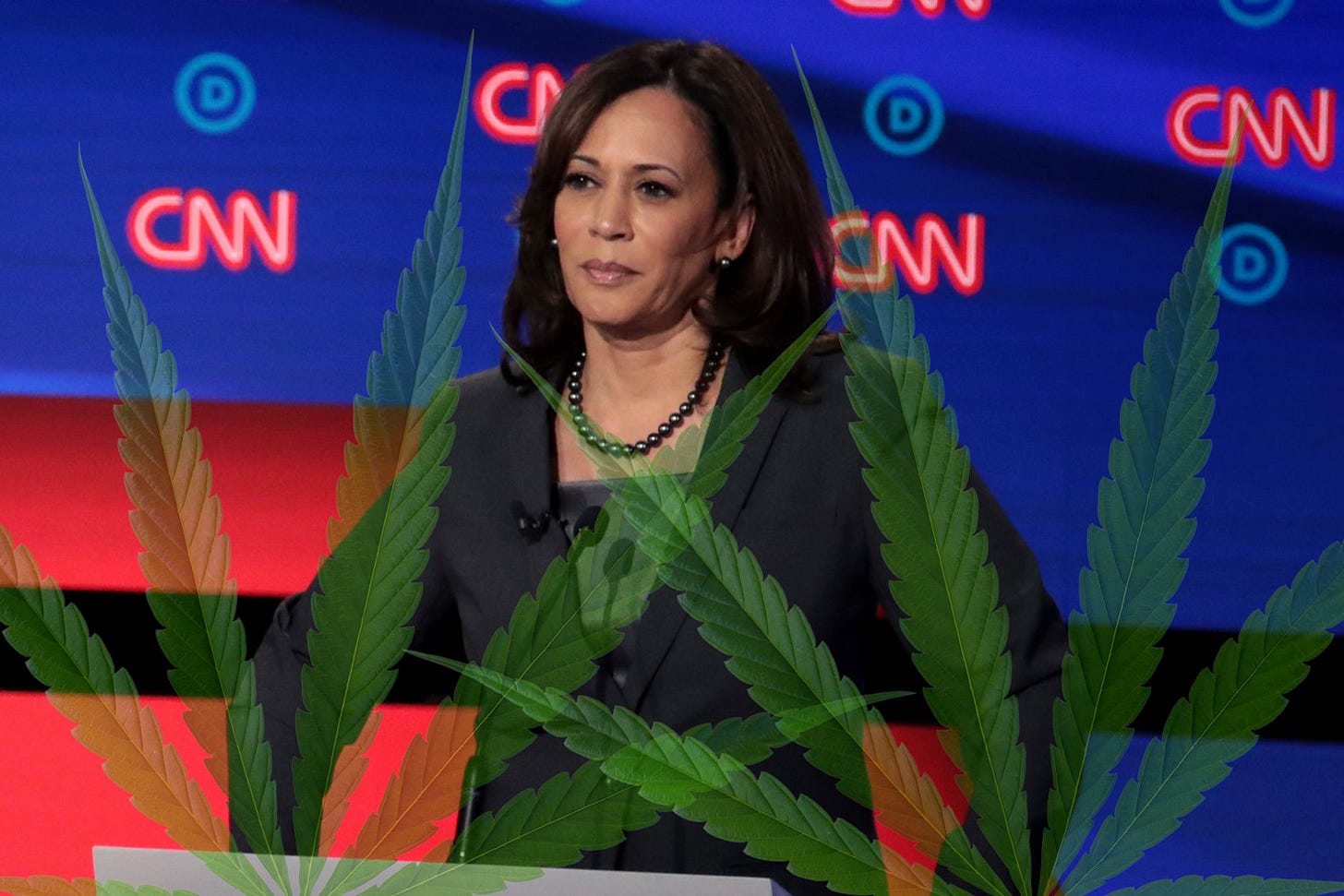*Editor’s Note: Dear Readers, I’ll be on vacation with the family for a few days, but fret not, because contributors will be stepping in with new content! Also, please do consider becoming a paid subscriber: $5 a month, $50 a year, or $250 as a founding member. I can only keep doing this with your financial support. Onward!
(Scott Olson/Getty Images)
By Kaivan Shroff
Earlier this year, at a White House meeting with those recently pardoned by President Biden for marijuana possession charges, Vice President Kamala Harris made waves saying of the Drug Enforcement Administration, “I cannot emphasize enough that they need to get to [a review of marijuana policy] as quickly as possible…And we need to have a resolution based on their findings and their assessment.”
A few weeks later, that resolution came as news broke that the DEA would reclassify the drug. It’s the latest sign the Biden-Harris administration is serious about its fight to decriminalize the drug. However, more deeply it should serve as a data point in the longstanding debate among change-makers – whether you can change the system from within or must engage in a less practical but more radical approach. Specifically, as some recycle attacks on Harris’s record as a prosecutor, the Democratic nominee’s navigation through marijuana reform is a model for progress. Notably, the Harris-Walz ticket is the first major ticket in history to support cannabis legalization.
In 2020, Harris said she supported legalization and even admitted “I did inhale” about whether she had ever tried the recreational favorite. Despite her progressive stance on the issue, her critics on the Left emphasized that – a decade earlier – San Francisco District Attorney Harris’s office prosecuted hundreds of marijuana possession cases. While true, of those found guilty, “only 45 people were sentenced to state prison for marijuana convictions during Harris’ seven years in office.” Still, she was accused of pandering and shamed for working within the criminal justice system. Some on the far left labeled her “Kamala the Cop” and even went so far as to accuse her of fabricating a memory of growing up listening to the music of Tupac. “To become a prosecutor is to make a choice to align oneself with a powerful and fundamentally biased system,” charged Bernie Sanders alumnus Briahna Gray.
Harris has, through demonstrated success as a principled reformer, climbed the political ladder in a short 15 years to transition from a DA who enforced the law to the second highest officer in the executive branch of the U.S. federal government where she has recently super-charged the effort to change a decades-long domestic policy. Notably, a policy that has disproportionately impacted communities of color. Her work on this issue and recent history-making visit to an abortion clinic, prove the value of authentic representation in government and within systems of power. Of course, this lies in stark contrast to the version of representation Republicans tried to exploit in their selection of “housewife” Sen. Katie Britt for the State of the Union rebuttal mocked around the world.
Perhaps most powerfully, in her call for DEA action, Harris did not deny the realities of her past engagement on the issue. At a roundtable event to discuss cannabis reform, the Vice President explained, “I believe that the promise of America includes equal justice under the law. And for too many, our criminal justice system has failed to live up to that core principle. And I say that with full knowledge of how this system has worked, including my experience as a prosecutor.”
President Biden took on the issue of marijuana reform – a presidential first, saying that nobody should be jailed for simple possession of the current Schedule 1 narcotic (the same as heroin). Harris appears to be leading the charge in the administration’s fight for sweeping progress on the issue. In addition to this DEA action, the Biden-Harris administration has issued two executive orders to loosen federal marijuana restrictions and issued mass pardons for certain types of low-level marijuana-related offenders. The administration is taking the fight for cannabis reform seriously. Given the ways law enforcement has weaponized marijuana policy against marginalized communities in the past decades, the level of systemic change that could result from this policy change is profound. Reformists have called for movement on federal cannabis policy for decades to no avail.
Now major change is on the horizon and it is in no small part because Kamala Harris chose to play by the rules and change the system by working within it.








Running on legalizing weed nationally would bring out a whole group of people who might otherwise stay home. It is crazy that I can walk into a dispensary in my state and buy whatever I want while people in other states could face prison time. It is long past time to push for legalization, not just decriminalizing it.
I've used marijuana for almost 60 years. I've dodged law enforcement of all sorts from the Don Knots of local towns to the heavy duty thugs of the DEA. They never were able to catch me. I had luck on my side, but they managed to keep me paranoid and nervous half the time. Most of my friends and acquaintances have been busted. Some have spent time in prison. What was the purpose of all this effort for law enforcement to waste time and money trying to stop people from using a substance that's virtually harmless. The result is exactly what we predicted years ago. Complete failure.Trillions wasted. Lives ruined. Marijuana legalized in some form in 40 states. Has there ever been a more horrendous government policy? It's caused people to distrust the government and hate law enforcement. Yet, that insane policy still continues in many places. That's the main reason people call for defunding the police. Can you blame them? Marijuana is still illegal in my state. How much more of this attack on the citizens of this country do we have to stand? Will I die before legalization becomes a reality everywhere? Dear god, I hope not! I would like to be able to smoke one legal joint before I die.